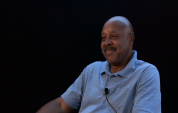9:44 | After a couple of days of fierce fighting, George Forrest was told his company was now attached to another unit and was bringing up the rear as they moved out on foot to make way for a B-52 strike. After uttering an expletive, he moved out with the column on the infamous march to LZ Albany, the last big engagement of the epic Battle of the Ia Drang Valley. Part 2 of 4.
Keywords : George Forrest Vietnam Hal Moore Robert Tully Buse Tully Robert McDade Arc Light B-52 Fred Kluge LZ Albany mortar ambush Terry Martell James Patswall Joe Galloway

George Forrest left home thinking his father had acquiesced to the white power structure in his home town. When he returned, though, he found out that what he'd done was just the opposite. Enjoying the ROTC element of his college experience, Forrest received a commission in the Army and had some interesting assignments before he joined a newly organized air assault division.
Convinced they were going to storm the beach when they arrived in Vietnam, George Forrest's unit instead found the 1st Cavalry band playing. They set up base camp, where the living conditions were not that bad, and began getting used to being attached to other units, which was bad. They took their first casualty in a particularly disappointing incident.
The Chieu Hoi were Viet Cong defectors who assisted American units in Vietnam, but George Forrest quickly realized that the ones at his base were not all that they seemed. The mortar fire at night was really accurate. He had a great admiration and respect for his own men, and lists the NCO's and officers who were the backbone of his company.
Before they got into any serious combat, George Forrest's unit kept busy building their base camp and looking for some diversions, including wrestling matches between the officers and the men. They were dismissive of both the enemy and the Vietnamese people they were protecting, but when he returned years later, he realized they were human beings like any others. This realization has implications for today's soldiers deployed as nation builders.
He should have been leery of the whole thing. George Forrest's unit was protecting convoys on the highway when the word came, a unit was heavily engaged in the Ia Drang Valley. From that point on, nothing seemed right, starting with Chinooks instead of Hueys coming to transport them. They arrived the second day of the battle and bolstered the exhausted troops led by Hal Moore. Part 1 of 4.
They were hunkered down after fierce fighting when the call came from "Ghost 4-6." It was a group of wounded men who had pulled themselves together after the ill fated march to LZ Albany and were lost in the dark. George Forrest sent a patrol to find them, and in an incredible act of bravery, medic Daniel Torres stayed through the night with them and saved many men. Captain Forrest still had to write a gut-wrenching letter to the mother of a missing soldier. Part 3 of 4.
It was a classic L-shaped ambush that decimated several companies on the march to LZ Albany. George Forrest's company had fared better, but instead of heading to a Thanksgiving dinner like some, they went straight to another battle at Bong Son. He observes that you can go through hell and come out better for it and his company was stronger for the experience. Decades later, he gained an appreciation for the way the opposition must have felt. Part 4 of 4.
George Forrest remembers the men under his command as both grand and simple, guys who could find humor in anything. Life in war meant that basic needs and desires came to the forefront. For Forrest, that meant ice cream and dry toilet paper. When he left the command, his men made sure he knew that he'd made a difference in their lives.
Returning from his first tour of Vietnam, George Forrest went straight to Fort Benning, so it was a good experience. As for the return from the second tour, it wasn't the worst day of his life, but it was right up there as he changed into civilian clothes to avoid the protesters. He thinks about the conditions for service members today and wonders if the overwhelming social media communications are a good thing for morale and focus.
The war changed him for the better, says George Forrest, though it took a while to realize that family was more important than chasing a military career. A visit to Vietnam decades after the conflict made him wonder if it had been worth it. He does know two things, he would have liked a free ticket to a Packers game and he wishes the war was remembered for more than alleged atrocities and stoned troops.
His Vietnam experienced influenced and guided every job he had throughout his life, says George Forrest. He was disappointed in the Vietnam Veterans Memorial at first, but that changed when he visited. And he finally got his parade.